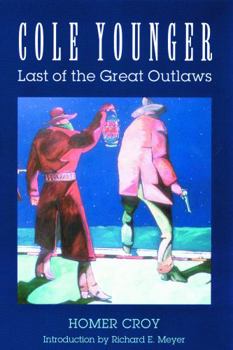Cole Younger: Last of the Great Outlaws
Select Format
Select Condition 
Book Overview
Violence dictated the daily rhythms of Cole Younger's life. During the Civil War he was selected to join Quantrill's Raiders because he owned his own revolver. His participation in the brutal 1863 raid on Lawrence, Kansas, drove him and other guerrillas into hiding as Union troops sought to punish the perpetrators of atrocities including the murder of women and children. Younger met up with Jesse James in 1866. The James and Younger families cooperated...
Format:Paperback
Language:English
ISBN:0803264003
ISBN13:9780803264007
Release Date:November 1999
Publisher:Bison Books
Length:250 Pages
Weight:0.70 lbs.
Dimensions:0.6" x 5.5" x 8.5"
Customer Reviews
2 ratings
Who Was Cole Younger?
Published by Thriftbooks.com User , 20 years ago
Homer Croy was the first student of the first school of journalism in the world (University of Missouri). He was born close to Jesse James' farm. Cole Younger came from the most fought-over county in Missouri; fighting began before the Civil War and continues after its end. Cole first killed at 17, was wanted dead or alive at 18, rode with Quantrill at 19. He killed 17 men, was wounded 30 times, but died peacefully in bed with 14 bullets in him. In between he spent over 25 years in prison. If you wonder about strife in countries in countries (like Yugoslavia) just read about the Border War in America circa 1860. I enjoyed the style of writing. This is history written by a journalist. You'll not be bored, since it reads like the newspaper story it was. Most of the great Civil War outlaws were born within 30 miles of Kansas City. Henry Washington Younger was one of the richest and important men of Jackson County, and was elected 3 times to the Missouri legislature, and a mayor in 1859. Thomas Coleman Younger was the 7th son of 14 children. One of Cole's teachers was Stephen B Elkins, later US Senator from West Virginia; Cole saved his life. The Border War was conducted by gangs who were mostly interested in plunder first, flag second. Most families were peaceful, but could not avoid the troubled times. An incident at a dance forced Cole to become a hunted man. The holdup and murder of his father by Kansan Red Legs embittered Cole. Cole joined the Confederate Army, and was famed for his ruthlessness in battle, yet was kindly and considerate afterwards. Cole took part in the raid on Lawrence Kansas.After the war ended Cole and Frank James invented bank robbery in Liberty Missouri 1866. Since Cole was well known, he quickly left for Texas. They gambled away their loot in Dallas. But they had been recognized, and the Pinkertons put their names on a wanted poster: Cole and Jim Younger, Frank and Jesse James, Jim Cummings, Charlie Pitts. Chapter VIII explains how the James-Younger gang covered their tracks; but they were still pursued. Since their gang was well-known, they decided to strike out for Minnesota. Their attempt in Northfield left four of their group dead, others wounded, without a cent. (The unclaimed bodies were donated to medical science.) The quick-witted Cole created a political reason to rob this bank: General Benjamin F Butler was an owner! Cole would say what it took to escape hanging. By pleading guilty they escaped execution. Cole became a model prisoner to get a pardon.After his pardon, Cole was introduced to modern wonders: the telephone, the horseless carriage, the phonograph. For the first time in 25 years Cole saw a sunset. When Cole got an unconditional pardon, he returned to Missouri. After failing as a salesman, Cole joined the "Cole Younger-Frank James Wild West Show" until he retired. There is one interesting item: the Youngers were all Southerners, but their father was a Union sympathizer and did not believe in slavery! Wa
Great Storytelling
Published by Thriftbooks.com User , 23 years ago
Homer Croy is a first-rate storyteller in a very casual, homey sort of way. He writes this book about Cole Younger's life in such a way that you feel as though you're sitting around the fire with Homer while he tells the tale. It's very entertaining reading with many good touches of humor and wry comments throughout. As history...First of all, he doesn't footnote in the traditional way but does include notes about each chapter explaining his sources. It's an informal, rather than scholarly, style. His research was extensive and tended toward finding people who could give him first-hand accounts, or as near to first-hand as possible family stories, along with contemporary newspaper accounts. In this way he hunts down the sources of many of the myths, legends, and rumors surrounding Cole Younger's life and career. Is he right about every particular and conclusion? I don't know. I'd say to read this book hand-in-hand with one of the more recent high-quality works like Marley Brant's "Outlaw Youngers" to compare versions of events. Croy is very up-front with his opinions, something I appreciated. The author of such a book is the one who did the research, has a feel for the subject even in areas where hard data may be lacking, and I want to hear their opinion on disputed matters. Some history authors won't go out on that limb but Homer Croy has no such problem. He usually is clear on what is his opinion and what he has some evidence on, but he also recreates some scenes and conversations for which there could not possibly be any witnesses. So bear in mind there is an element of fictional novelization to the story. Don't miss the index--most entertaining index I've ever read.





